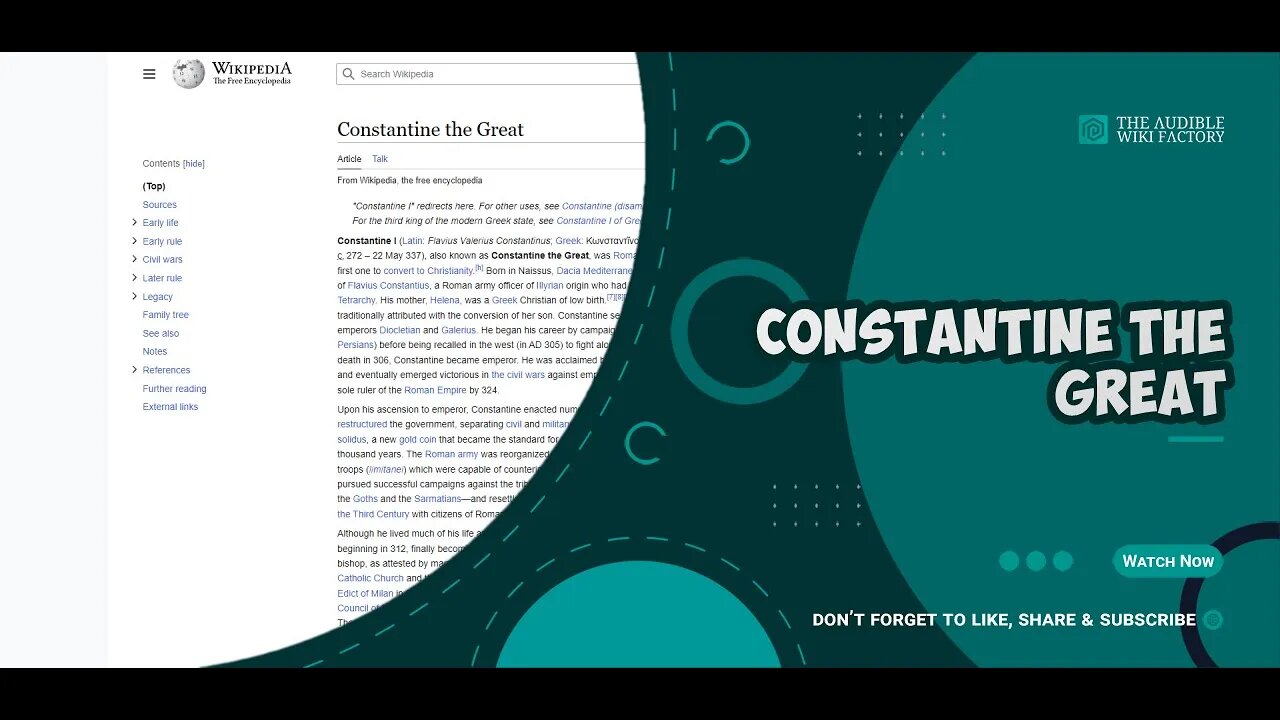Premium Only Content

Constantine I, also known as Constantine the Great, was Roman emperor from AD 306 to 337, the
Constantine I, also known as Constantine the Great, was Roman emperor from AD 306 to 337, the first one to convert to Christianity. Born in Naissus, Dacia Mediterranea (now Niš, Serbia), he was the son of Flavius Constantius, a Roman army officer of Illyrian origin who had been one of the four rulers of the Tetrarchy. His mother, Helena, was a Greek Christian of low birth. Later canonized as a saint, she is traditionally attributed with the conversion of her son. Constantine served with distinction under the Roman emperors Diocletian and Galerius. He began his career by campaigning in the eastern provinces (against the Persians) before being recalled in the west (in AD 305) to fight alongside his father in Britain. After his father's death in 306, Constantine became emperor. He was acclaimed by his army at Eboracum (York, England), and eventually emerged victorious in the civil wars against emperors Maxentius and Licinius to become the sole ruler of the Roman Empire by 324.
Upon his ascension to emperor, Constantine enacted numerous reforms to strengthen the empire. He restructured the government, separating civil and military authorities. To combat inflation, he introduced the solidus, a new gold coin that became the standard for Byzantine and European currencies for more than a thousand years. The Roman army was reorganized to consist of mobile units (comitatenses) and garrison troops (limitanei) which were capable of countering internal threats and barbarian invasions. Constantine pursued successful campaigns against the tribes on the Roman frontiers—such as the Franks, the Alemanni, the Goths and the Sarmatians—and resettled territories abandoned by his predecessors during the Crisis of the Third Century with citizens of Roman culture.
Although he lived much of his life as a pagan and later as a catechumen, he began to favor Christianity beginning in 312, finally becoming a Christian and being baptised by either Eusebius of Nicomedia, an Arian bishop, as attested by many notable Arian historical figures, or Pope Sylvester I, which is maintained by the Catholic Church and the Coptic Orthodox Church. He played an influential role in the proclamation of the Edict of Milan in 313, which declared tolerance for Christianity in the Roman Empire. He convoked the First Council of Nicaea in 325 which produced the statement of Christian belief known as the Nicene Creed. The Church of the Holy Sepulchre was built on his orders at the purported site of Jesus' tomb in Jerusalem and was deemed the holiest place in all of Christendom. The papal claim to temporal power in the High Middle Ages was based on the fabricated Donation of Constantine. He has historically been referred to as the "First Christian Emperor" and he did favor the Christian Church. While some modern scholars debate his beliefs and even his comprehension of Christianity, he is venerated as a saint in Eastern Christianity, and he did much for pushing Christianity towards the mainstream of Roman culture.
The age of Constantine marked a distinct epoch in the history of the Roman Empire and a pivotal moment in the transition from classical antiquity to the Middle Ages. He built a new imperial residence at the city of Byzantium and renamed it Constantinople (now Istanbul) after himself. It subsequently became the capital of the empire for more than a thousand years, the later Eastern Roman Empire often being referred to in English as the Byzantine Empire, a term never used by the Empire, invented by German historian Hieronymus Wolf. His more immediate political legacy was that he replaced Diocletian's Tetrarchy with the de facto principle of dynastic succession by leaving the empire to his sons and other members of the Constantinian dynasty. His reputation flourished during...
LINK TO ARTICLE: http://en.wikipedia.org/wiki/Constantine_the_Great
TAGS: Constantine the Great, Illyrian emperors, Valerii, Tetrarchy, Sons of Roman emperors, People from Niš, Military saints, Greek people, Illyrian people, Gothicus Maximus, Flavii, Filicides, Deified Roman emperors, Converts to Christianity from pagan religions, Constantinian dynasty, Christian royal saints, Byzantine saints, Burials at the Church of the Holy Apostles, Angelic visionaries, Ancient Romans in Britain, 4th-century Roman emperors, 4th-century Roman consuls, 4th-century Christian saints, Constantine the Great
#GeneralKnowledge #AudibleWikiFactory #Audible #Wikipedia #ConstantinetheGreat
-
 41:13
41:13
The Audible Wiki Factory
2 years agoThe Oktoberfest is the world's largest Volksfest, featuring a beer festival and a travelling
443 -
 1:57:40
1:57:40
MattMorseTV
2 hours ago $3.61 earned🔴Trump just SHATTERED the PROJECTIONS.🔴
14.4K14 -
 LIVE
LIVE
megimu32
1 hour agoOTS: From Star Search to Superstardom
212 watching -
 LIVE
LIVE
Joker Effect
11 minutes agoInterviewing GREENMAN! Looks like he is coming to Rumble! Let's give him a warm welcome! REAL TALENT
227 watching -
 1:46:17
1:46:17
Glenn Greenwald
4 hours agoGlenn Takes Your Questions on Censorship, Epstein, and More; DNC Rejects Embargo of Weapons to Israel with Journalist Dave Weigel | SYSTEM UPDATE #505
80.1K3 -
 LIVE
LIVE
Jokeuhl Gaming and Chat
6 hours agoHelldivers 2 - Spreading Democracy w/ Ryker
52 watching -
 27:47
27:47
Stephen Gardner
1 hour ago🚨BREAKING: Trump FURIOUS Over Kamala’s Latest Move – SHOCKING Details!
1.81K11 -
 8:00:13
8:00:13
Dr Disrespect
9 hours ago🔴LIVE - DR DISRESPECT - GEARS RELOADED GLOBAL LAUNCH - CRUSHING LOCUST
97.6K13 -
 LIVE
LIVE
Reolock
2 hours agoWoW Classic Hardcore | One level at a time
31 watching -
 LIVE
LIVE
Spartan
5 hours agoScrims vs FaZe then Ranked + Expedition 33
8 watching